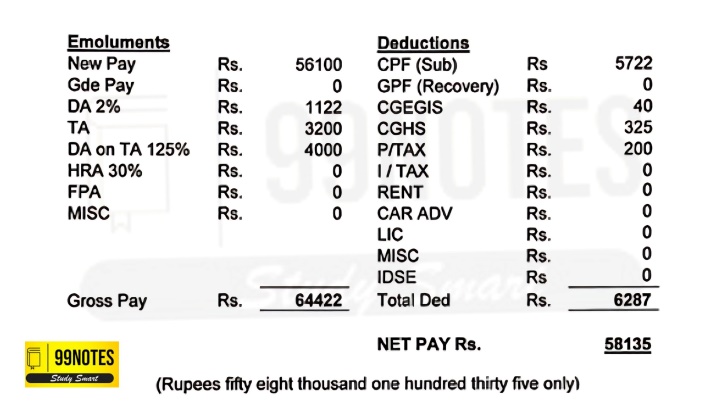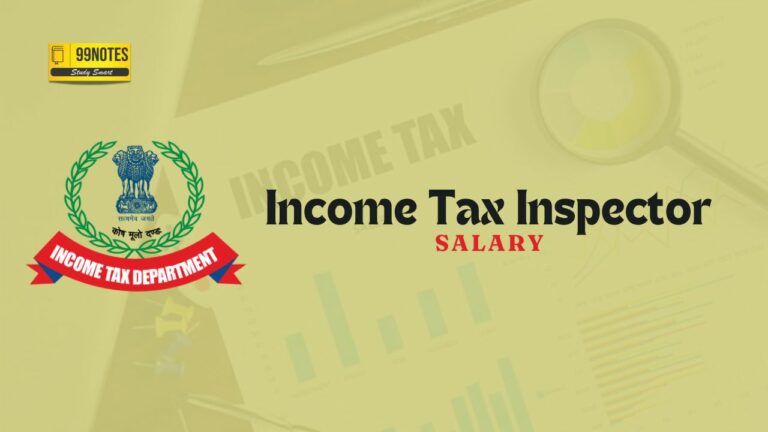DSP Salary Per Month in India- 7th Pay Commission, Perks and Allowance in 2024
DSP Salary– The starting salary for a DSP as a Pay Matrix Level, DSP corresponds to a monthly salary range of ₹56,100 to ₹1,77,500 on the pre-revised pay scale, DSP salaries are eligible to a number of allowances in addition to their base pay, which make up a sizable portion of their total compensation package.
DSP Salary as per the 7th Pay Commission
As per the 7th Pay Commission, the salary of a Deputy Superintendent of Police (DSP) in India varies based on several factors including the location of posting, years of service, and specific allowances applicable.
Here’s a general overview of the salary structure for a DSP under the 7th Pay Commission given below:
| DSP Salary as per the 7th Pay Commission | |
| Category | Salary |
Pay Level | 10 |
Pay Band | PB-3 (15600 to 39100) |
Grand Pay | 5400 |
Pay Scale | ₹56,100/- – 1,77,500/- |
Basic Salary | ₹56,100 /- |
| Minimum Salary | ₹1,77,500- |
| Dearness Allowance (DA) | ₹25806/- (46% Of Basic Pay) |
| House Rent Allowance (HRA) | ₹14157/- (27% Of Basic Pay) |
| Transport Allowance (TA) | ₹7200/- to ₹10000/- |
| Other Allowances | ₹9500/- |
| Starting In Hand Salary | ₹86130/- per month (Approx) |
| Maximum In Hand Salary | ₹263860/- per month (Approx) |

Note- Important to know that the salary given above is approximate and can vary based on specific circumstances and government regulations. For the most accurate and up-to-date information, it’s advisable to refer to official government sources salary structures that may be subject to change due to revisions in government policies or pay commissions.
DSP Salary as Per 6th Pay Commission
As per the 6th Pay Commission, the salary structure for Deputy Superintendent of Police (DSP) in India varied based on several factors including the location of posting, years of service, and specific allowances applicable.
The general overview of the salary structure for a DSP under the 6th Pay Commission give below:
| DSP Salary Structure as per 6th Pay Commission | |
| Category | Salary |
| Pay Level | 9 |
| Pay Band | PB-2 (9300 to 34800) |
| Grade Pay | 5400 |
| Pay Scale | 53100/- – 1,67,800/- |
| Basic Salary | ₹ 53100 /- |
| Maximum Salary (Without Any Promotion) | ₹1,67,800/- |
| Dearness Allowance (DA) | ₹20178/- (38% Of Basic Pay) |
| House Rent Allowance (HRA) | ₹14337/- (27% Of Basic Pay) |
| Transport Allowance (TA) | ₹7200/- to ₹10000/- |
| Starting In Hand Salary | ₹119864/- per month (Approx) |
Promotion in DSP
Promotion is granted to the DSP through the Departmental Promotion Committee and in which the Chairman of the Commission, in accordance with the rules framed by the State Government you can also refer the table given below;
| Promotion in DSP |
| Deputy Superintendent of Police (DSP) ⇓Additional Superintendent of Police (ASP) ⇓ Superintendent of Police (SP) ⇓Senior Superintendent of Police (SSP) ⇓Deputy Inspector General of Police (DIGP) ⇓Inspector General of Police (IGP) ⇓Additional Director General of Police (ADGP) ⇓Director General of Police (DGP) |
Eligibility for DSP
The Deputy Superintendent of Police (DSP) post is filled with responsibilities, so here we are discussing some responsibilities that come under DSP.
Following are the eligibility criteria for DSP in India are given below;
- Applicants must be Indian citizens.
- Candidates must have graduated from a recognized university in any stream.
- Candidate’s age should be between 21 years old and 30 years old and there is 5-year relaxation available in the upper age limit for SC / ST applicants.
- The least height needed is 168 centimeters for male applicants, and 155 centimeters for female applicants.
- For men, the minimum chest expected is 84 centimeters, with the least expansion of 5 centimeters.
Roles and Responsibilities as a DSP
The DSP is deputy superintendent of police and they work under the S.P. and oversees all the police department tasks such as preventing crime, managing police stations, looking after the investigations, and so on.
The following are the roles and responsibilities of a DSP give below;
- Maintaining Records: As the district’s top intelligence officer, the DSP gathers data from lower-level police officers and reports his findings to his superiors in the district police personnel system, as well as checking up with the service conditions of the younger officers under his command.
- Supervision: A DSP manages and controls the crowd during political rallies and functions so that no kind of clashes can occur between people and manages the crowd during the festival and maintains a healthy environment.
- Emergency Response: A DSP develops new ways to tackle crime and catch criminals and is responsible for deterring criminal activity, supervising all the cases and investigations related to it are under his control and doing research operations to solve cases.
- Law Enforcement: Another role is to manage and maintain good law and order and can also take action against the people who break the law and order.
- Community Engagement: DSP also attempts to build good community links and maintain communal harmony, sees whether the laws are followed by the citizens or not and takes necessary actions against them and tries to make a good bond with citizens and the police.
Process of selection
The candidate who wishes to become a DSP Officer ,must take part in the State level test carried out by the State Public Service Commission and the candidates who pass this exam undergo probationary training before they are posted as DSPs.
The following are the stages to be selected as a DSP.
- Preliminary and Main Written Examination
- PET (Physical efficiency test)
- Medical test and interview.
Benefits as a DSP
- Law enforcement officers are respected members of society, and DSPs often receive recognition and appreciation for their service to the community.
- Working in law enforcement provides opportunities to network with other professionals in the field, as well as with government officials, community leaders, and members of the public.
- Serving as a DSP allows you to make a positive impact on society by maintaining law and order, protecting communities, and ensuring public safety. This sense of fulfilment and purpose can be one of the most rewarding aspects of the job.
- DSP officers may receive comprehensive healthcare coverage for themselves and their families, including medical, dental, and vision benefits.
Conclusion
In India, DSP salaries are eligible for a number of allowances in addition to their base pay, which make up a sizable portion of their total compensation package and the average salary for a DSP is around ₹1.5 lakh per annum but this can vary depending on the state place city in which they are working. Salary levels may be higher in larger cities and lower in smaller towns.DSP is a police officer grade at the Indian police force and DSP stands for Deputy Superintendent of Police, who is responsible for managing law and order in district divisions.


